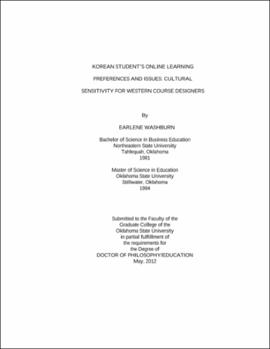| dc.contributor.advisor | Ausburn, Lynna | |
| dc.contributor.author | Washburn, Earlene | |
| dc.date.accessioned | 2013-11-26T08:35:00Z | |
| dc.date.available | 2013-11-26T08:35:00Z | |
| dc.date.issued | 2012-05 | |
| dc.identifier.uri | https://hdl.handle.net/11244/7616 | |
| dc.description.abstract | Scope and Method of Study: | |
| dc.description.abstract | While online courses offer educational solutions, they are not academically suited for everyone. International students find distractions in online courses constructed with Western philosophy, epistemology, values, and cultures as compared to experiences in their home country. Learner's cultural, value system, learning preferences, and philosophies should be considered when designing online courses with consideration for how culture influences students' learning. Henderson's Multiple Cultural Model (1996) was the theoretical framework used to identify online learning preferences that Korean students recognize as web-based course distractions. | |
| dc.description.abstract | This study used descriptive methodology in a mixed-method design, combining demographic and learning preferences through quantitative data along with qualitative data obtained from personal interviews. A web-based, confidential survey questionnaire provided quantitative data for the descriptive study that used 65 demographic, open-ended and force-choice questions and 3 open-ended questions. The instrument was web-based constructed so that it becomes accessible to students from any location. Volunteering students were purposefully selected for face-to-face qualitative interviews based on their points of view, opinions, and online experiences. Variables were Korean culture-independent and learning preferences-dependent. | |
| dc.description.abstract | Descriptive statistics, factor analysis, t-test, and thematic analysis emit the major findings. The demographic profile of the population reflective via a five-point Likert-type rating scale, measuring learning preferences by indicating measures of response by; 1=strongly disagree, 2=disagree, 3=no preference, 4=agree, and 5=strongly agree. Thematic analysis of the qualitative data expressed online learning experiences offered by Korean students. | |
| dc.description.abstract | Findings and Conclusions: Koreans' educational preferences are very traditional teacher-centered but are slowly changing to more Americanized educational system. While Koreans like the new flexible, more Americanized educational process, they still feel a strong commitment to the former/traditional Korean cultural educational process. While technical issues, complications with high-speed Internet, and the lack of additional learning resources were very highly rated problems, the lack of communications was equally a problem. Students wanted/needed greater communications with their professor; both on a personal level and in the classroom. They wanted to be able to ask questions, obtain answers immediately, have a personal relationship with their professor, and engage with the professor for reassurance and a greater understanding. They hold the professor in highest esteem with greatest respect to guide the learning. | |
| dc.format | application/pdf | |
| dc.language | en_US | |
| dc.rights | Copyright is held by the author who has granted the Oklahoma State University Library the non-exclusive right to share this material in its institutional repository. Contact Digital Library Services at lib-dls@okstate.edu or 405-744-9161 for the permission policy on the use, reproduction or distribution of this material. | |
| dc.title | Korean student's online learning preferences and issues: Cultural sensitivity for Western course designers | |
| dc.contributor.committeeMember | McCharen, Belinda | |
| dc.contributor.committeeMember | Hoon Song, Ji | |
| dc.contributor.committeeMember | Kutz, Mary | |
| dc.contributor.committeeMember | Ausburn, Floyd | |
| osu.filename | Washburn_okstate_0664D_12089 | |
| osu.accesstype | Open Access | |
| dc.type.genre | Dissertation | |
| dc.type.material | Text | |
| dc.subject.keywords | curriculum development | |
| dc.subject.keywords | learning preferences | |
| dc.subject.keywords | multi-cultural | |
| dc.subject.keywords | online course construction | |
| dc.subject.keywords | online learning | |
| dc.subject.keywords | South Korea | |
| thesis.degree.discipline | Teaching and Curriculum Leadership | |
| thesis.degree.grantor | Oklahoma State University | |
